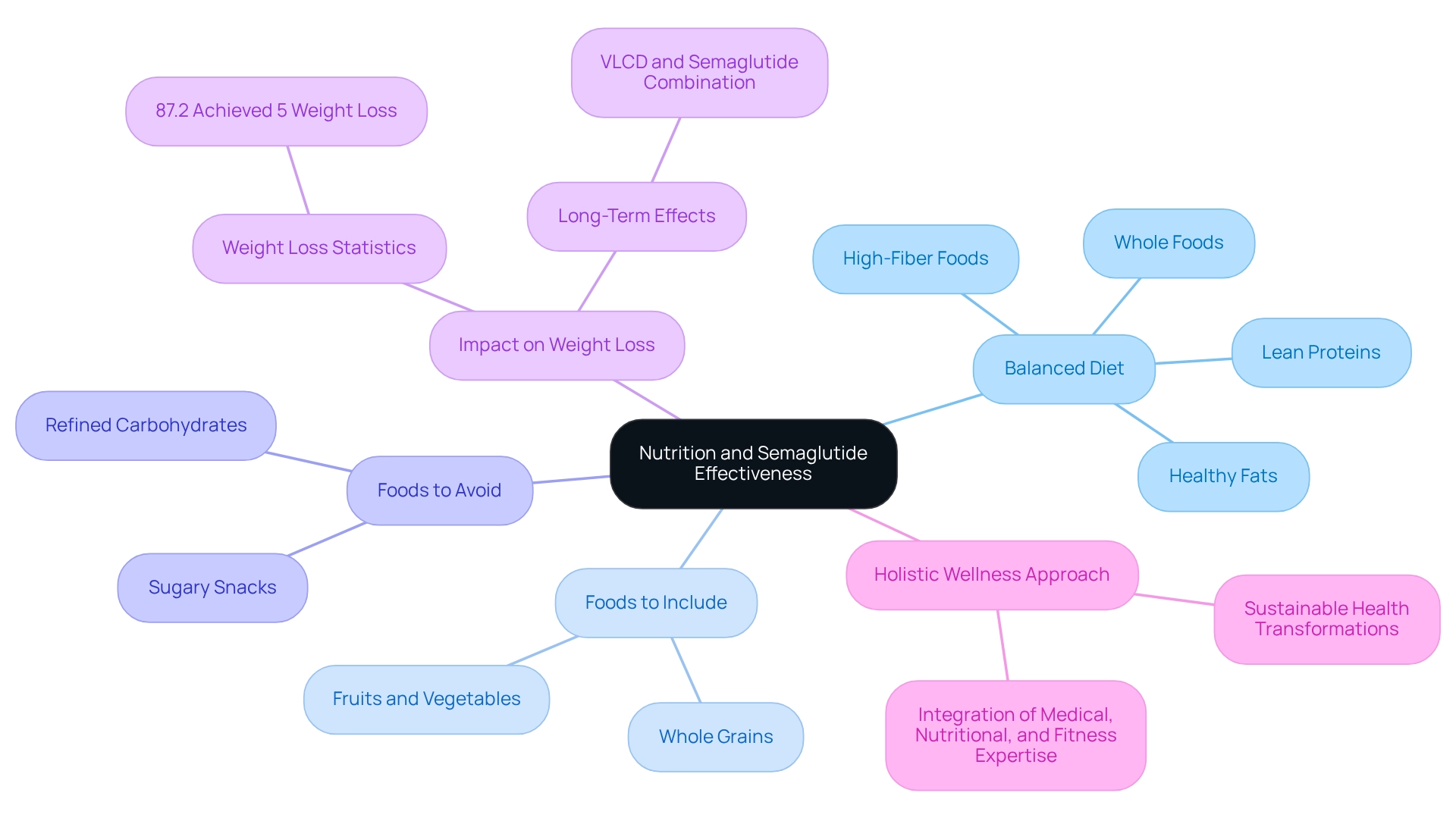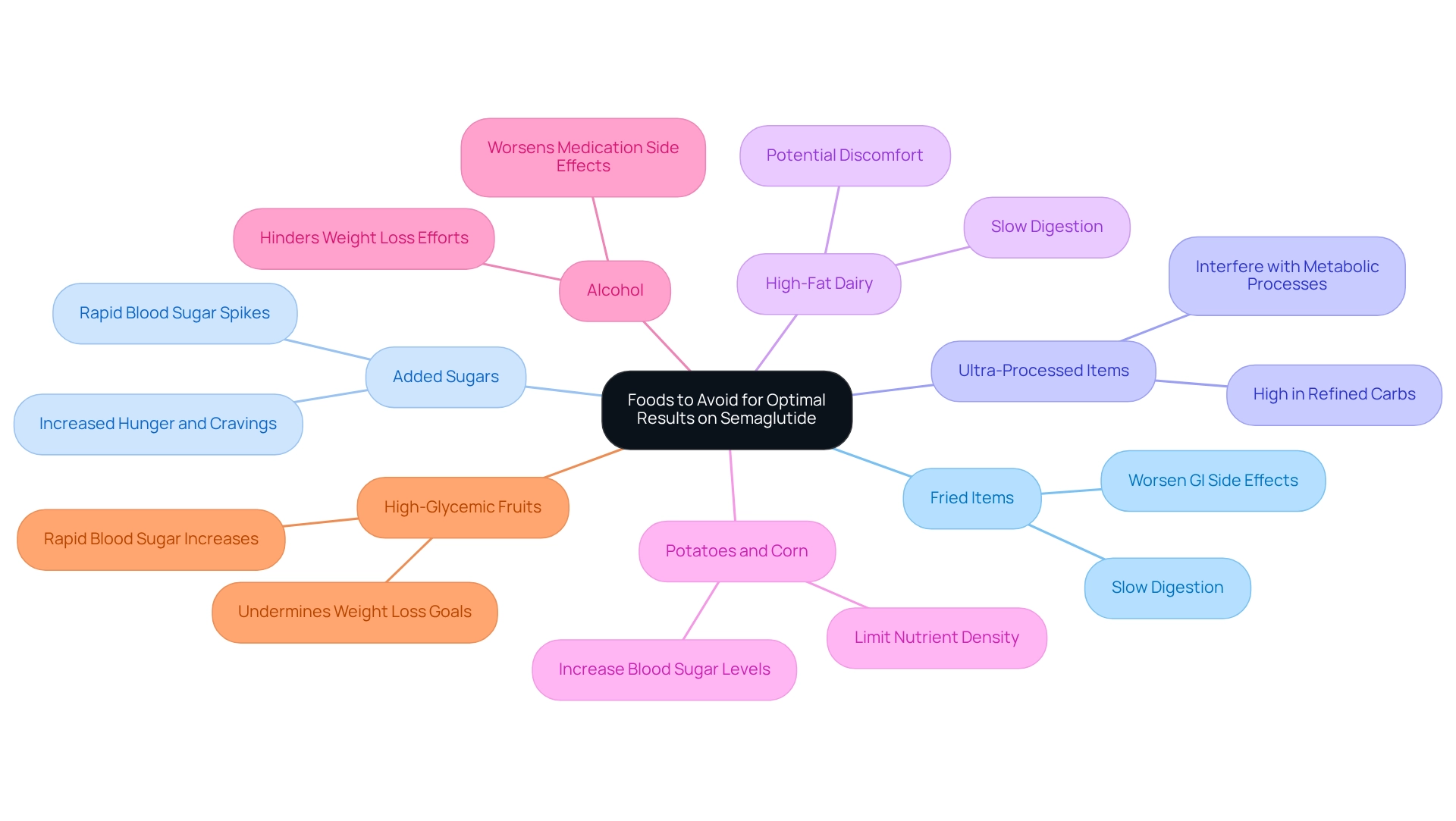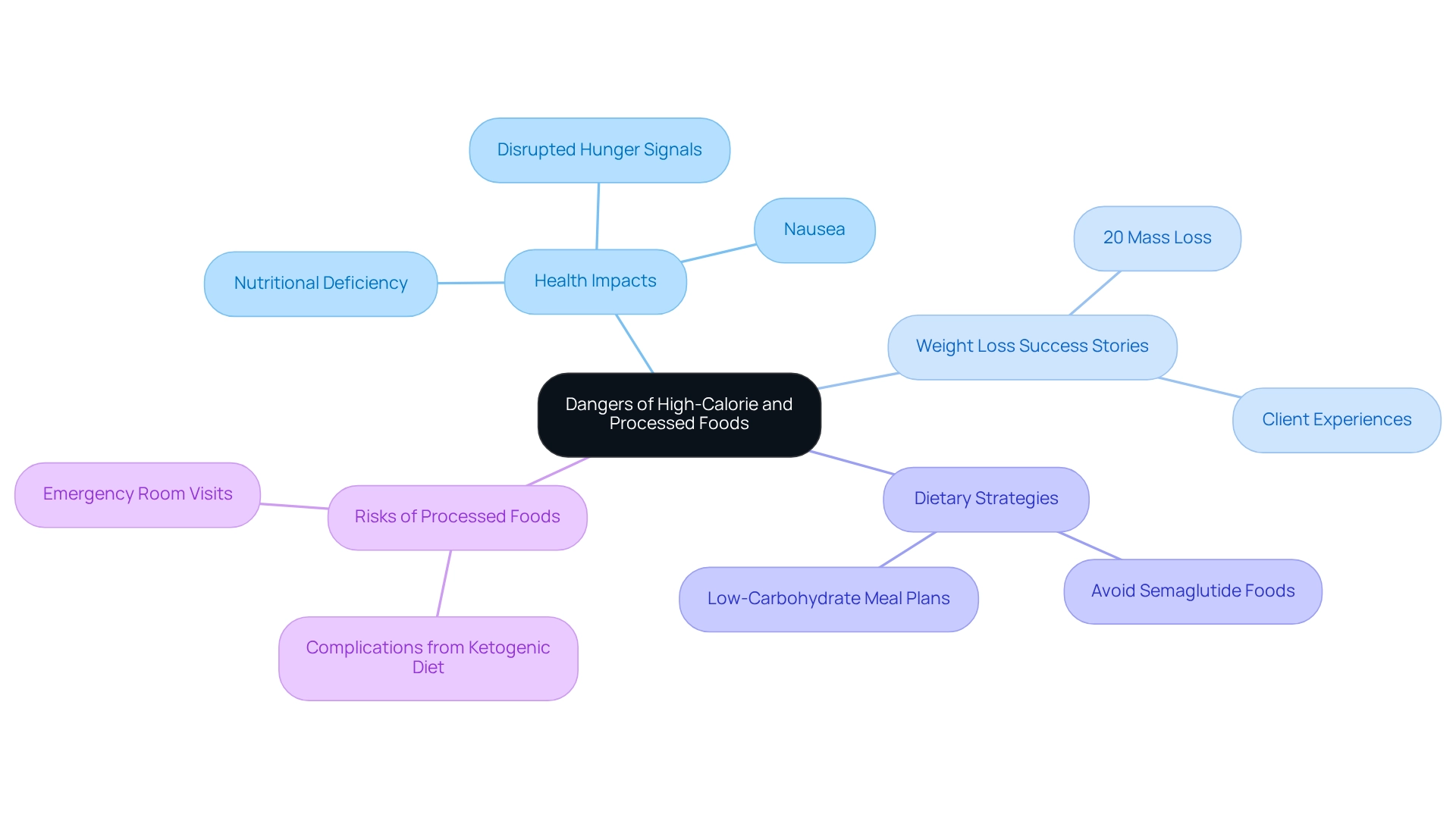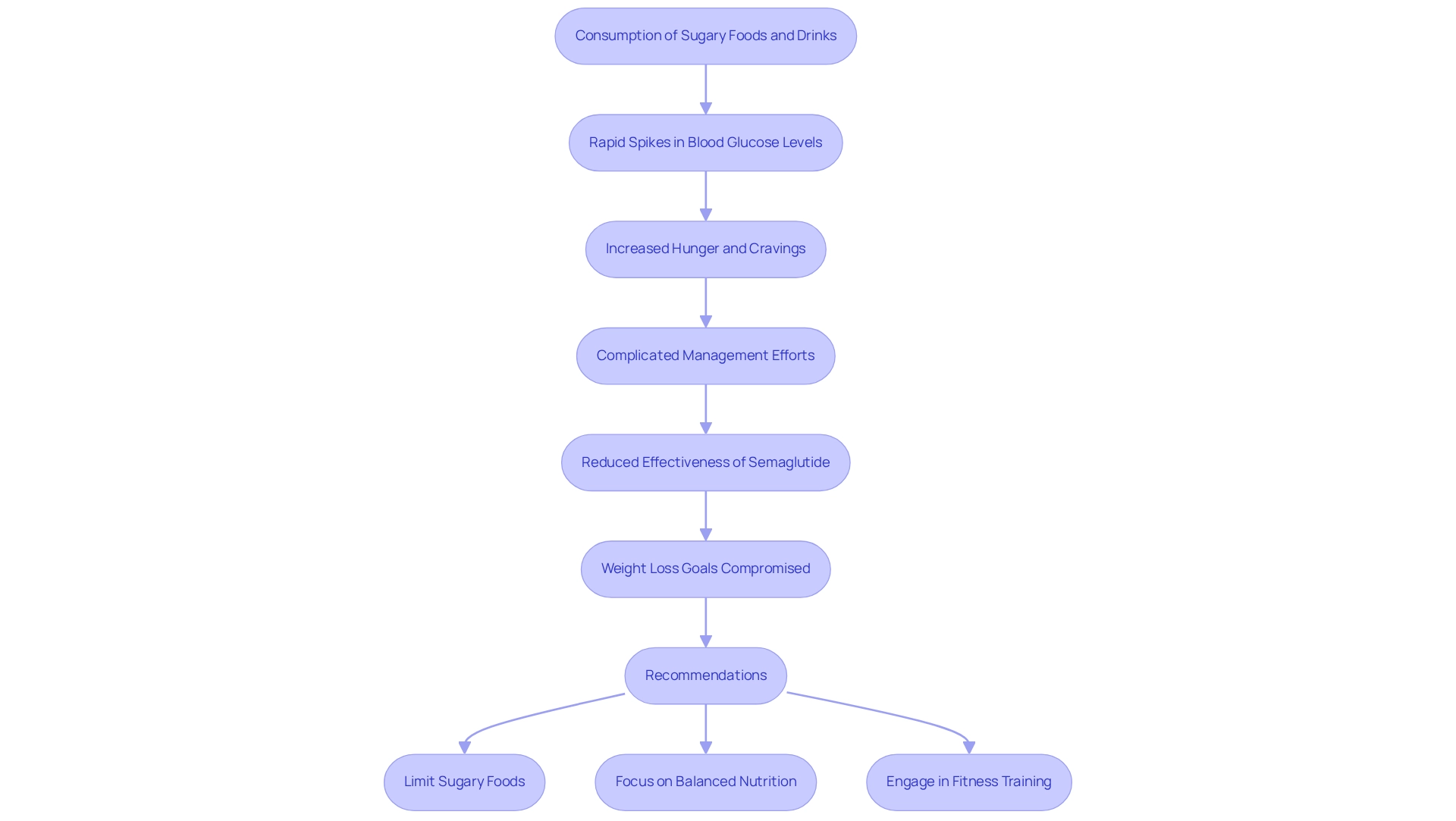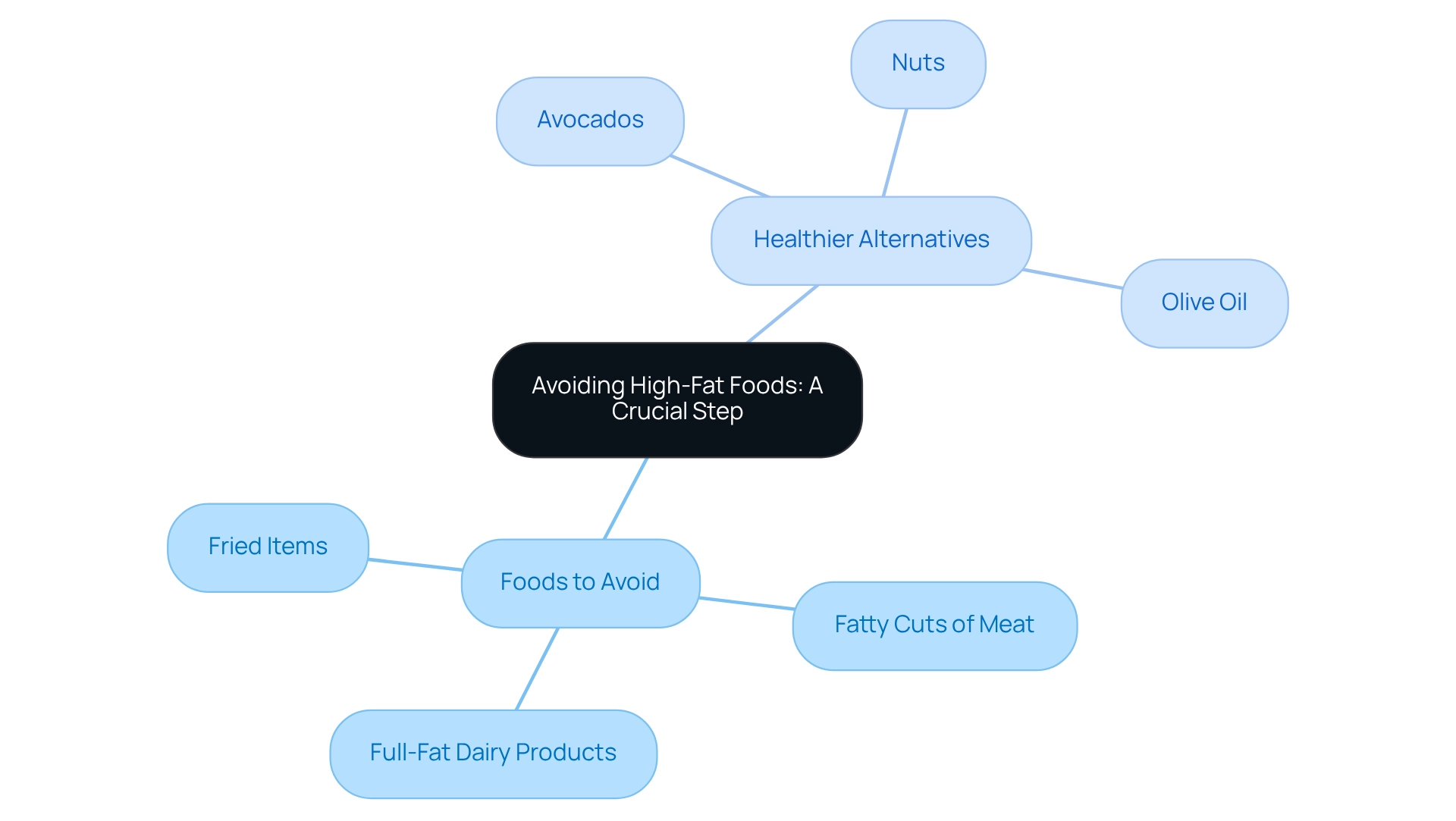Overview
Navigating your weight loss journey can be challenging, especially when it comes to making dietary choices. This article highlights seven foods to avoid while taking semaglutide to help you achieve optimal weight management results. These include:
- Fried items
- Sugary foods
- Ultra-processed items
- High-fat dairy
- High-glycemic fruits
Understanding the impact of these foods is crucial, as they can worsen gastrointestinal side effects, lead to rapid blood sugar spikes, and ultimately hinder the medication’s effectiveness in promoting weight loss.
We know how overwhelming it can feel to make the right choices, but remember, you’re not alone in this journey. By steering clear of these specific foods, you can support your body and enhance the benefits of semaglutide. Every small step you take is a move toward your goals, and together, we can achieve them.
As you consider your dietary habits, reflect on how these foods might affect your progress. It’s about finding balance and making choices that nurture your health. Embrace this opportunity to learn and grow, and know that each decision brings you closer to the results you desire. We’re here for you every step of the way.
Introduction
In the quest for effective weight management, semaglutide has emerged as a groundbreaking solution, offering individuals a powerful tool to regulate appetite and enhance feelings of fullness. By mimicking the natural hormone GLP-1, this medication aids those struggling with obesity to make healthier food choices and control caloric intake. However, the journey doesn’t end with a prescription; understanding the dietary landscape is crucial for maximizing its benefits.
This article delves into the essential role of nutrition in conjunction with semaglutide. We’ll highlight key foods to avoid, explore the dangers of high-calorie and processed options, and emphasize the importance of mindful eating practices. By integrating these insights, we can work together to optimize your weight loss efforts and achieve sustainable health improvements. Remember, we’re here for you every step of the way.
Understanding Semaglutide: A Key to Weight Management
Semaglutide, a glucagon-like peptide-1 (GLP-1) receptor agonist, plays a pivotal role in weight management by effectively regulating appetite and enhancing feelings of satiety. By mimicking the GLP-1 hormone, which is naturally released in response to meal consumption, this medication helps decrease appetite and promotes a sense of fullness. This mechanism is particularly beneficial for individuals facing obesity, as it empowers them to make healthier food choices and better manage their caloric intake.
Recent research has shown the effectiveness of this medication in clinical settings, with participants experiencing notable weight loss. For instance, one study demonstrated an 11.6% greater reduction in body mass with a daily dosage of 0.4 mg of the drug compared to a placebo after 52 weeks. Additionally, the combination of 2.4 mg of the medication administered weekly along with lifestyle changes has led to sustained, clinically significant reductions in individuals with excess body mass or obesity.
On average, individuals using Ozempic or Wegovy lose 15-20% of their weight within a year, highlighting the effectiveness of these treatments. As Robert F. Kushner, who has received consulting fees from several health organizations, notes, the impact of this medication on body mass management is substantial and merits consideration.
Understanding how this medication works is essential for maximizing its benefits, particularly by recognizing the semaglutide foods to avoid through dietary changes. By effectively reducing appetite, this medication helps individuals make informed dietary choices, specifically regarding foods to avoid, ultimately supporting their weight management goals. Moreover, Minimal’s holistic approach combines personalized fitness, nutrition guidance, and alternative treatments, ensuring comprehensive care for sustainable health improvements.
A case study titled ‘Weight Loss and Anthropometric Outcomes by Subgroups’ highlighted that women experienced more significant weight loss with the medication compared to men, and younger patients showed increasingly greater average weight loss. This insight is crucial for anyone looking to maximize the effectiveness of their treatment while navigating their dietary landscape. Together, we can achieve your goals and foster a healthier lifestyle.
The Importance of Nutrition in Enhancing Semaglutide’s Effectiveness
Nutrition plays a vital role in optimizing the effectiveness of semaglutide, especially within the framework of Minimal’s holistic wellness solutions. Have you considered how a balanced diet can enhance your journey? By emphasizing whole foods, you can significantly improve the medication’s appetite-suppressing qualities and help maintain stable blood sugar levels. Including high-fiber foods, lean proteins, and healthy fats not only fosters a sense of fullness but also reduces cravings, making it easier to stick to your weight loss goals.
However, it’s important to be mindful of foods that can cause rapid spikes in blood sugar, as these can counteract the benefits of the medication. Understanding the nutritional landscape is essential for anyone using semaglutide, as it directly influences weight loss outcomes and overall health.
Dietitians emphasize that a strategic approach to nutrition can enhance the results achieved with the medication. For instance, a fiber-rich diet can slow digestion and promote a feeling of fullness, perfectly complementing the appetite control provided by semaglutide. Nutritionists recommend focusing on whole, unprocessed foods while steering clear of sugary snacks and refined carbohydrates, which can lead to energy crashes and increased hunger.
Recent research shows that individuals who pair a balanced diet with this medication experience more significant reductions in body mass. At week 68, an impressive 87.2% of patients on semaglutide achieved at least a 5% reduction in mass, underscoring the effectiveness of this combination. Dr. Andres Acosta from the Mayo Clinic notes, “This research could serve as a foundation for showing the efficacy of the medication for patients looking to reduce their mass.”
This partnership between medication and nutrition highlights the importance of dietary choices, including foods to avoid, in enhancing treatment efficacy. It’s crucial for users to be aware of what they consume as they work towards a healthier body.
Moreover, a recent study concluded that combining the medication with a very low-calorie diet (VLCD) is more effective than the medication alone in improving health outcomes. This reinforces the need for a holistic approach to health and wellness, as exemplified by Minimal’s program, which integrates medical, nutritional, and fitness expertise, along with alternative treatments, to support sustainable health transformations. Together, we can achieve your goals, and Minimal’s comprehensive weight loss prescription program is designed to empower individuals to make healthier dietary choices while utilizing medications.
Top 7 Foods to Avoid for Optimal Results on Semaglutide
Fried items, which are high in unhealthy fats, are foods to avoid while using semaglutide, as they can significantly worsen gastrointestinal side effects such as nausea and bloating. These foods also slow digestion, making them particularly challenging to tolerate during your treatment. Research indicates that individuals who avoided these foods, including fried options, experienced improved comfort and commitment to their weight loss plans. At Minimal, we offer customized solutions to help you find alternatives that satisfy your cravings without compromising your health.
Foods and drinks laden with added sugars are also considered to be avoided with semaglutide, as they can cause rapid spikes in blood sugar levels, counteracting the intended effects of the medication. This can lead to increased hunger and cravings, undermining your weight loss efforts. Studies show that minimizing sugar intake is essential for maximizing the benefits of semaglutide, which is why knowing which foods to avoid is crucial. Our holistic health services at Minimal include counseling to help you navigate these dietary challenges effectively.
Ultra-processed items, often high in refined carbohydrates and unhealthy fats, should be avoided as they can contribute to weight gain. These foods can interfere with metabolic processes and reduce the medication’s effectiveness, making it vital to focus on whole, nutrient-rich alternatives. Minimal emphasizes whole foods and meal planning to support your weight loss journey.
High-fat dairy products, such as full-fat cheeses, cream, and butter, can slow digestion and may cause discomfort when combined with the medication. Choosing low-fat or plant-based alternatives can help alleviate these issues and promote smoother digestion. Our team at Minimal is here to assist you in finding dairy alternatives that align with your dietary needs.
While on this medication, it’s best to limit foods like potatoes and corn, as they can cause increases in blood sugar levels. Instead, incorporating non-starchy vegetables will provide essential nutrients without negatively impacting your blood sugar. Minimal offers personalized meal planning services to help you make these adjustments seamlessly.
Excessive alcohol intake can hinder your weight loss efforts and worsen the side effects of the medication. Moderation is key, as alcohol can also lead to poor dietary choices and impede progress. Our holistic health services include strategies for managing social situations involving alcohol.
High-glycemic fruits, including bananas and grapes, should be consumed in moderation as they can cause rapid increases in blood sugar. Focusing on lower-glycemic fruits can help maintain stable blood sugar levels and support your weight loss goals. At Minimal, we provide guidance on selecting fruits that fit your dietary plan.
Incorporating these dietary considerations can greatly improve the effectiveness of your treatment. Remember to take the oral tablet 30 minutes before any food or drink; this is essential for maximizing its effects. As Sean Wharton points out, the two-year impacts of the medication in adults with excess weight or obesity underscore the importance of adhering to dietary guidelines.
The Phase 3 clinical trial of the medication demonstrated notable and sustained reductions in body mass over 104 weeks compared to placebo, highlighting the need for careful dietary management. By prioritizing a balanced diet and avoiding these specific items, you can enhance your health results during treatment, with the support of Minimal’s comprehensive care.
The Dangers of High-Calorie and Processed Foods
For individuals using the medication, it’s important to be mindful of high-calorie and processed items, often referred to as semaglutide foods to avoid. This is especially true for those pursuing personalized reduction strategies through Minimal’s holistic method. These foods tend to be low in essential nutrients and high in unhealthy fats and sugars, leading to excessive caloric intake without the nutritional benefits needed for good health. Research indicates that avoiding these semaglutide foods can not only support fat reduction efforts but also prevent unwanted weight gain, aligning with the goals of using semaglutide.
In fact, many clients at Minimal have experienced remarkable success, losing up to 20% of their mass based on data from over 70,000 patients who have been part of the program for at least six months. This underscores the crucial role that dietary choices play in achieving weight reduction objectives.
Moreover, these high-calorie items can worsen common side effects associated with the medication, such as nausea and bloating. The consumption of processed foods can disrupt the body’s natural hunger signals, making it increasingly challenging to maintain a healthy eating plan. For example, a case study on the Atkins Diet revealed that its initial phase, which involves strict carbohydrate restriction, can lead to negative effects like headaches and fatigue, particularly for those with certain health conditions.
This serves as a reminder of the potential risks associated with high-calorie diets, particularly for those who should be cautious about semaglutide foods to avoid.
Nutritionists at Minimal emphasize the importance of steering clear of high-calorie processed items to better manage body mass. As Wajeed Masood points out, individuals with metabolic syndrome or insulin resistance may notice improvements in their health markers by adhering to a well-structured, very low-carbohydrate meal plan that minimizes processed foods. Additionally, the Rome Declaration on Nutrition and the Framework for Action advocate for strategies that promote safe and healthy diets, reinforcing the necessity of mindful dietary choices.
Therefore, avoiding semaglutide foods to avoid is essential for anyone looking to maximize the benefits of the medication and achieve sustainable reductions in body mass. It’s also vital to be aware of the complications associated with the ketogenic diet, which can lead to emergency room visits, further highlighting the risks of high-calorie and processed foods in the context of body mass management. Remember, together, we can navigate this journey towards better health.
Why You Should Steer Clear of Sugary Foods and Drinks
Sweet items and drinks can significantly hinder the effectiveness of medications designed to aid in body mass reduction. Consuming these items often results in rapid spikes in blood glucose levels, which can lead to heightened hunger and cravings shortly after eating. Research indicates that high sugar consumption is not only associated with increased mass but also contributes to insulin resistance, complicating management efforts.
For those using semaglutide, it’s essential to be aware of the semaglutide foods to avoid, particularly sugary foods and drinks. Limiting or eliminating these from your diet can help maintain stable blood sugar levels, which is vital for achieving your weight loss goals.
At Minimal, we understand the importance of a holistic approach to managing body mass. Our comprehensive weight loss prescription program includes:
- Personalized treatments
- Fitness training
- Nutrition guidance
- Alternative therapies such as breathwork and acupuncture
All tailored to your unique needs. Statistics show that in a controlled diet intervention, participants who adhered to a lower sugar intake lost an average of 2.6 kg over six months, compared to just 1.7 kg for those with higher sugar consumption.
This underscores the impact of sugar on body control, especially regarding semaglutide foods to avoid. Nutritionists emphasize that sugary foods fall into this category, as they can undermine the medication’s effectiveness by causing fluctuations in blood sugar that counteract the benefits of the treatment. Furthermore, evidence supporting the role of low-calorie sweeteners (LCS) in managing body mass is limited, highlighting the need for randomized controlled trials for a clearer understanding.
Real-world examples further illustrate this point. In Turkey, a notable decline in the incidence of type 2 diabetes (T2D) was observed, attributed to reduced consumption of sugar-sweetened beverages (SSBs). This trend emphasizes the broader implications of sugar intake on health outcomes, particularly in lower-income nations where SSB consumption is linked to higher health risks.
Dr. Chance Miller notes, “Clients appreciate the personalized attention from a dedicated care team, which includes physicians like Dr. Chance Miller, who emphasize transformative care.”
This customized approach is crucial when considering dietary choices while using the medication, aligning with our commitment at Minimal to foster sustainable health habits through a patient-focused approach to wellness.
In conclusion, avoiding semaglutide foods to steer clear of, such as sweet items and beverages, is vital for those using the medication. This practice helps maintain stable blood sugar levels and enhances the overall effectiveness of your journey toward reducing body mass. Remember, we’re here for you, and together, we can achieve your goals.
Avoiding High-Fat Foods: A Crucial Step
High-fat items can significantly hinder the effectiveness of your medication, primarily by slowing digestion and increasing gastrointestinal side effects such as nausea and bloating. If you’re on this medication, it’s important to be mindful of semaglutide foods to avoid, including:
- Fried items
- Fatty cuts of meat
- Full-fat dairy products
Research shows that diets high in fat can disrupt the intestinal barrier, leading to various health issues, including nonalcoholic fatty liver disease (NAFLD) and other gastrointestinal complications.
This disruption is closely linked to the ‘intestine-liver axis,’ which highlights the vital relationship between gut flora and liver health. At Minimal, we believe in a holistic approach to shedding pounds. We integrate personalized fitness and nutrition guidance with reduction prescriptions like Semaglutide. Experts emphasize the importance of moderation in fat intake. As Dr. Mahendran Jayaraj wisely states, “As with most things in life, moderation is key to healthy fat intake.”
This perspective is especially crucial for users of the medication, as it underscores the semaglutide foods to avoid, particularly high-fat items that can undermine its effectiveness and make it more challenging to achieve your desired weight loss outcomes.
Statistics reveal that individuals adhering to high-fat diets often face difficulties in managing their weight. Studies indicate that such diets can lead to a three-fold increase in serum lipopolysaccharides (LPS), which are linked to inflammation and metabolic disorders. Moreover, case studies have shown that a Western-style high-fat diet is associated with obesity, diabetes, and cardiovascular diseases, while also adversely affecting gastrointestinal health. The review titled “Consequences of Western-Style High-Fat Diet on Intestinal Health” discusses these broader implications and raises awareness about the dietary impacts on intestinal physiology.
To enhance the benefits of your medication, we recommend avoiding semaglutide foods to avoid and instead focusing on healthier fat sources. Incorporating foods like avocados, nuts, and olive oil can provide essential nutrients without the adverse effects linked to high-fat diets. Furthermore, adding hydrophilic bile acids, such as ursodeoxycholic acid, might enhance intestinal barrier integrity, offering a potential remedy for individuals concerned about gastrointestinal health while using this medication.
By implementing these dietary changes, you can improve appetite regulation and enhance your overall outcomes while on the medication, supported by Minimal’s comprehensive wellness services. Remember, we’re here for you, and together, we can achieve your goals.
Mindful Eating: Best Practices for Semaglutide Users
Mindful eating serves as a transformative practice, fostering a deeper awareness of hunger and fullness signals. Are you ready to embrace this journey? Here are some effective strategies to incorporate into your routine:
- Eat Slowly: Take the time to savor each bite. This not only enhances satisfaction but also helps prevent overeating, allowing your body to signal when it is full.
- Portion Control: Consider using smaller plates and measuring your servings. This simple adjustment can significantly aid in managing portion sizes, making it easier to stay within your caloric goals.
- Limit Distractions: Try to avoid multitasking during meals, such as watching TV or scrolling through your phone. Focusing solely on your meal can enhance your eating experience and help you recognize when you are satisfied.
- Stay Hydrated: Remember to drink plenty of water throughout the day. Proper hydration supports digestion and overall health, which is crucial when making dietary changes.
- Listen to Your Body: Tune into your hunger signals and eat only when you are genuinely hungry. This practice can assist in reducing excessive snacking and foster a healthier connection with food.
Integrating these mindful eating techniques, especially the semaglutide foods to avoid, can greatly enhance the efforts of semaglutide users, leading to better overall health. Research indicates that mindful eating can positively influence body management, with studies showing it may mediate changes in fasting glucose levels over a 12-month assessment period. The Cronbach’s alpha coefficient for the WHOQOL-BREF was found to be 0.89, indicating high internal reliability in the measures used to assess quality of life and health outcomes related to mindful eating practices.
By adopting these practices, you can create a sustainable approach to your health journey, perfectly aligning with the holistic solutions offered by Minimal. As Dr. Chance Miller emphasizes, clients appreciate the personalized attention from a dedicated care team, enhancing their transformative care experience.
Additionally, various protocols and questionnaires used in nutritional intervention studies provide real-world examples of how mindful eating practices are assessed and their impact on health outcomes. Furthermore, Minimal’s personalized weight loss solutions are designed to complement these mindful eating strategies, ensuring that clients receive comprehensive support tailored to their unique health needs. Together, we can achieve your goals!
Conclusion
In summary, semaglutide offers a groundbreaking approach to weight management, effectively helping to regulate appetite and enhance feelings of fullness for those who are struggling with obesity. Yet, the path to sustainable weight loss extends beyond medication; it calls for a comprehensive understanding of nutrition. By embracing a well-rounded diet rich in whole foods, individuals can significantly amplify the benefits of semaglutide, ensuring that hunger is managed and cravings are kept at bay.
Avoiding high-calorie, processed foods is crucial for achieving optimal results. These foods not only undermine the effectiveness of the medication but can also worsen common side effects. Instead, by prioritizing nutrient-dense options and being mindful of dietary choices, individuals can see substantial improvements in their weight loss outcomes. Mindful eating practices—like taking the time to eat slowly and paying attention to hunger cues—can further enrich the journey, fostering a healthier relationship with food.
Ultimately, integrating semaglutide with a thoughtful dietary approach can lead to lasting health improvements. By adopting these strategies, individuals can navigate their weight loss journey more effectively, reaching their goals while enhancing their overall well-being. As the evidence suggests, a holistic approach that combines medication with sound nutritional practices is the key to unlocking the full potential of semaglutide and achieving sustainable weight management. Remember, together, we can achieve your goals, and we’re here for you every step of the way.
Frequently Asked Questions
What is semaglutide and how does it aid in weight management?
Semaglutide is a glucagon-like peptide-1 (GLP-1) receptor agonist that helps regulate appetite and enhance feelings of fullness. By mimicking the GLP-1 hormone released after meals, it decreases appetite and promotes a sense of satiety, which is particularly beneficial for individuals facing obesity.
What have recent studies shown about the effectiveness of semaglutide?
Recent research indicates that semaglutide is effective in clinical settings, with participants experiencing significant weight loss. One study found an 11.6% greater reduction in body mass with a daily dosage of 0.4 mg compared to a placebo after 52 weeks. Additionally, those using a weekly dosage of 2.4 mg along with lifestyle changes achieved sustained, clinically significant weight reductions.
How much weight can individuals expect to lose while using semaglutide?
On average, individuals using semaglutide (such as Ozempic or Wegovy) can expect to lose 15-20% of their weight within a year, demonstrating the treatment’s effectiveness in weight management.
What dietary changes should individuals consider while using semaglutide?
Individuals should focus on avoiding foods that cause rapid spikes in blood sugar, which can counteract the medication’s benefits. A balanced diet emphasizing whole foods, high-fiber foods, lean proteins, and healthy fats can enhance the appetite-suppressing qualities of semaglutide.
What role does nutrition play in the effectiveness of semaglutide?
Nutrition is crucial in optimizing the effectiveness of semaglutide. A strategic approach to diet, including a fiber-rich diet, can slow digestion and promote fullness, complementing the medication’s appetite control. Research shows that those who combine a balanced diet with semaglutide experience greater reductions in body mass.
Are there specific foods to avoid when using semaglutide?
Yes, individuals should avoid sugary snacks and refined carbohydrates, as these can lead to energy crashes and increased hunger, counteracting the benefits of semaglutide.
What additional findings have been reported regarding weight loss demographics?
A case study indicated that women experienced more significant weight loss with semaglutide compared to men, and younger patients showed even greater average weight loss. This information is important for maximizing treatment effectiveness.
How does Minimal’s holistic approach support individuals using semaglutide?
Minimal’s holistic approach combines personalized fitness, nutrition guidance, and alternative treatments to ensure comprehensive care for sustainable health improvements while utilizing semaglutide for weight management.




